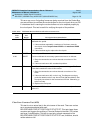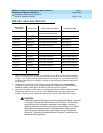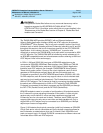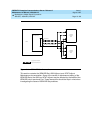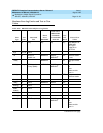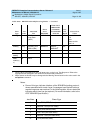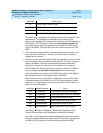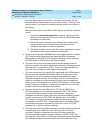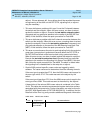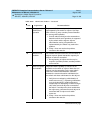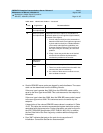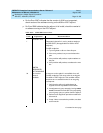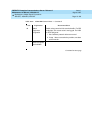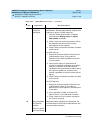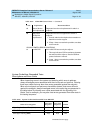
DEFINITY Enterprise Communications Server Release 6
Maintenance for R6vs/si
555-230-127
Issue 1
August 1997
Maintenance Object Repair Procedures
Page 10-184BRI-SET, ASAI-ADJ, BRI-DAT
10
terminal). While alarmed for this error, the switch momentarily (for five
seconds) takes the associated port out-of-service every 15 minutes. This
action is taken in an attempt to stimulate recovery actions to be taken by
the adjunct.
When this error occurs for an ASAI or AT&T adjunct, the service technician
should:
1. Execute the test station extension command, paying particular
attention to any tests which fail, and perform the associated repair
procedures for those tests.
2. Check the health of the adjunct by following the recommended
repair procedures of the manufacturer of the adjunct if the
preceding step does not resolve the problem.
3. The alarm condition persists and, if the above steps do not resolve
the problem, follow normal escalation procedures.
d. This error and associated WARNING alarm are logged against an ASAI or
AT&T endpoint when the adjunct has asked the switch to suspend
Maintenance on the ASAI or AT&T endpoint. Busying out and releasing
the ASAI station or ADJLK station will clear this alarm.
e. This error occurs when the endpoint sends more messages than the
switch can handle. The switch suspends the reception of messages from
the endpoint for a short period of time. There is no repair procedure for
this error. If the condition persists, replace the endpoint.
f. This error occurs when the signaling link associated with a BRI endpoint
has too much link establishment related traffic. This could occur if the
signaling link is bouncing between assigned and established states.
Software will suspend activity to this endpoint for 75 minutes when the
endpoint is alarmed due to this problem (note that service suspension
does not occur if the endpoint is an ASAI or AT&T adjunct). If this problem
persists, replace the endpoint. If replacing the endpoint does not fix the
problem, follow normal escalation procedures.
g. This error occurs when the ASAI-ADJ or ATT-ADJ or LGATE-AJ or
ATTE-AJ message is not transmitted because the PKT-CTRL (Packet
Control Circuit Pack) transmit buffers are exhausted. Frequent or
persistent occurrence of these events may indicate a hardware problem
or traffic overload on the PKT-CTRL, the signaling link, or the ASAI or
AT&T adjunct. Attempt to resolve the problem by following the repair
procedures for the PKT-CTRL. If these attempts fail, the problem should
be escalated because re-engineering of the traffic on the PKT-CTRL,
signaling link, or adjunct may be necessary.
h. This error occurs when the ASAI message is not transmitted because the
transmit buffer for the ASAI link is full, causing the link to be flow
controlled. Frequent or persistent occurrence of these events may
indicate a hardware problem or traffic overload on the PKT-CTRL, the
signaling link, or the ASAI or AT&T adjunct. Attempt to resolve the problem
by following the repair procedures issued by the manufacturer of the



